-
KOSPI 2577.27 -2.21 -0.09%
-
KOSDAQ 722.52 -7.07 -0.97%
-
KOSPI200 341.49 +0.02 +0.01%
-
USD/KRW 1396 -2.00 0.14%
Kospi to move in 2,350-3,200 range in 2025: brokerages
Korean stock market
Kospi to move in 2,350-3,200 range in 2025: brokerages
The extremely low valuation of Korean stocks compared to their global peers is one of the reasons for a recovery
By
Dec 31, 2024 (Gmt+09:00)
2
Min read
News+
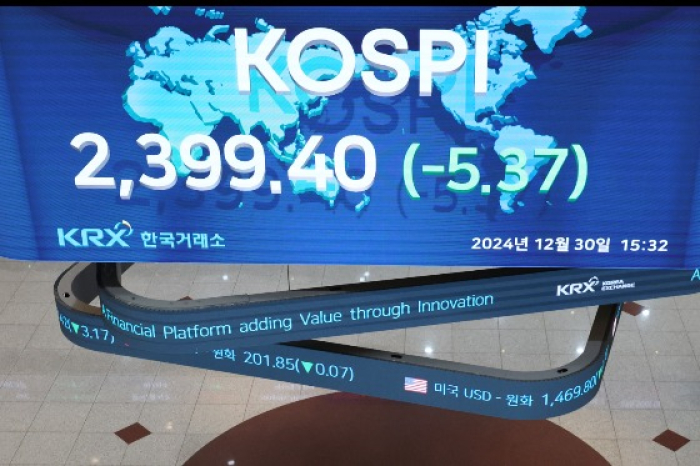
South Korean stocks are expected to bounce back in the new year as their extremely low valuation following investors’ massive sell-offs in 2024 would make their prices very attractive, according to a survey of local securities firms on Tuesday.
Korean brokerages see the current level of around 2,400 as being the rock bottom of the country’s benchmark Kospi index in 2025.
SK Securities Co. expects the Kospi to bottom out after hitting 2,416 in the new year, while Kiwoom Securities Corp. and Daishin Securities Co. forecast 2,400 and 2,380 as its lowest level, respectively.
Samsung Securities Co. and Mirae Asset Securities Co. projected the Kospi to bottom out at 2,350 for 2025.
Considering that the Kospi closed at 2,399.29 on Monday, the last trading day of 2024, Korean securities firms expected a recovery from its current level in the new year.
“Investors’ general consensus is that 2,400 is the psychological bottom,” said Kim Yong-gu, a senior analyst at Samsung Securities.
Once investors return to pick up Korean stocks, Kospi-listed stocks are expected to rebound quickly in 2025, securities firms forecast.
BULLISH UP TO OVER 3,200
SK Securities is the most bullish, projecting a ceiling at 3,206, while Shinhan Securities Co. forecasts 3,100.
Kiwoon Securities and Daishin Securities both forecast 3,000, while Samsung Securities and Mirae Asset Securities predict a ceiling of 2,850.
Based on their projections, the Kospi has room to jump 20% to 30% in 2025 versus 2024.
The rationale behind such a sharp gain is Korean stocks' extremely low valuation after investors dumped them in 2024 over concerns about individual companies’ earnings, including the country’s stock market bellwether Samsung Electronics Co., and the pace of growth in Asia’s fourth-largest economy.
The country’s political crisis triggered by President Yoon Suk Yeol’s ill-fated bid to impose martial law further weighed on the country’s stocks, causing the Korean currency to depreciate sharply against the US dollar.
The Kospi remained stagnant throughout 2024, declining for six consecutive months and underperforming most of its global peers.
Once Korean stocks start bouncing back, they are expected to revive the appetites of foreign and idle funds, analysts said.
Foreign investors’ net selling of Korean stocks has moderated from 7.42 trillion won in September to 2.86 trillion won in December after Korean stocks’ valuation plunged.
Write to Han-Shin Park at phs@hankyung.com
Sookyung Seo edited this article.
More To Read
-
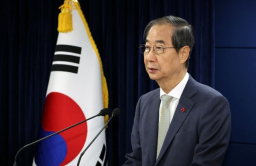 Business & PoliticsSouth Korea’s Acting President Han impeached; Stocks, won plummet
Business & PoliticsSouth Korea’s Acting President Han impeached; Stocks, won plummetDec 27, 2024 (Gmt+09:00)
-
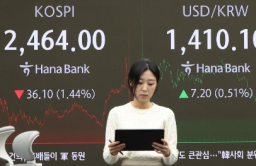 Korean stock marketKorean stocks diverge: Winners, losers of Yoon’s martial law debacle
Korean stock marketKorean stocks diverge: Winners, losers of Yoon’s martial law debacleDec 04, 2024 (Gmt+09:00)
-
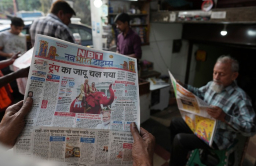 Korean stock marketS.Korean retail investors rush to buy Indian stocks on dips
Korean stock marketS.Korean retail investors rush to buy Indian stocks on dipsNov 10, 2024 (Gmt+09:00)
-
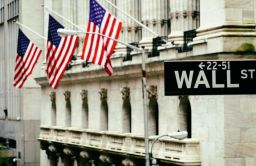 Korean InvestorsS.Korean investors' US stock holdings surpass $100 bn
Korean InvestorsS.Korean investors' US stock holdings surpass $100 bnNov 11, 2024 (Gmt+09:00)
-
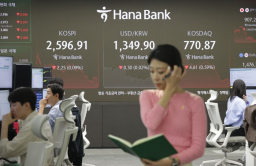 Korean stock marketForeign appetite for Korean stocks wanes with $5.5 bn in September sales
Korean stock marketForeign appetite for Korean stocks wanes with $5.5 bn in September salesOct 11, 2024 (Gmt+09:00)


